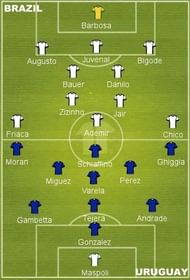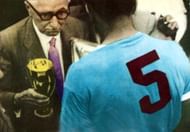Brazil impose themselves
The game kicked off, and true to their attacking nature, Brazil controlled the game right from the first minute. In the first three minutes of the game, Brazil forward Ademir (the tournament’s top scorer) had already tested Uruguay goalkeeper Roque Maspoli twice. The Brazilians peppered Uruguay’s goal with a number of shots and pushed the Uruguayans back on a number of occasions.
But despite the unforgiving Brazilian attack and the voices of 200,00 and an entire nation behind them, the 11 Uruguayan men on the field refused to give in. Brazil’s best effort in the first half also fell to Ademir whose header was tipped over the crossbar with a stunning effort. The half had intriguing tactical and “physical battles” all over the pitch with Alcides Ghiggia giving Brazil trouble on the right flank and was involved in more than one altercation with Brazil defender Bigode. Varela and Bigode even squared up on one occasion, only to be separated by English referee George Reader. Uruguay had their chances too, but the half ended with Brazil having taken 17 shots on goal!
The second half started just as the first half had with Brazil on the front foot. Before Uruguay could settle down, the hosts struck in the 47th minute. Friaca made a run down Uruguay’s left flank and Ademir released him with a pass that took him past Rodriguez Andrade and fired a weak shot to the far post. Maspoli, who had been in such inspiring form in the first half, was wrong footed and failed to get a hand on the ball.
The Maracana exploded! Fireworks and rockets, which were supposed to be banned inside the stadium to prevent any untoward incidents, went off inside the concrete behemoth as the rambunctious crowd deliriously celebrated with the Selecao, who now had one hand on the trophy. All they needed was a draw and the team was 1-0 up.
But at that moment, Varela decided to take matters into his own hands. As the Brazilian team and crowd celebrated, he started arguing with the linesman over why the offside flag wasn’t raised. In truth, he was trying to delay the restart so that the crowd would scream itself hoarse; to bring the excitement levels down a few notches. “Let them shout, in five minutes the stadium will seem like a graveyard”
Maracanazo
Although it didn’t take five minutes, his prediction wasn’t exactly off the mark. With Brazil only needing a draw, Flavio Costa asked his team to sit back and absorb Uruguay’s attack and exploit and vacant spaces in their half. It backfired. Varela grabbed the opportunity with both hands and, now relieved of additional defensive responsibilities, started to initiate attacks.
Brazil played an unconventional W-M formation, one they hadn’t used much until the World Cup. It would prove to be their undoing and it was exposed in the 66th minute when Valera found Ghiggia, who got the better of Bigode and crossed the ball into the box where an onrushing Juan Alberto Schiaffino took the shot first time and blasted it into the roof of the net.
Nervous anticipation now spread through the aisles of the Maracana. Although Brazil were still on course to lift the trophy with a little over 20 minutes to play, fear, doubt and ‘what if’ scenarios started to grip the crowd and the noise slowly started to ebb away.
“When the players needed the Maracana the most, the Maracana was silent” – Chico Buarque
The momentum was with Uruguay and in the 79th minute, Ghiggia with some neat inter-play with Perez found himself on the right flank again, making a clean run through the inside channel. Goalkeeper Moacyr Barbosa was ready for the cross but instead, Ghiggia struck a hopeful shot towards the near post. Barbosa dived to his left to save it but missed. Uruguay were 2-1 up.
Deafening silence.
In a matter of 13 minutes, Brazil had seen its hopes of lifting a first World Cup trophy evaporate in front of their own eyes. With 10 minutes to go, Brazil poured forward but were easily dealt with by Uruguay. Fans who were initially screaming in delight were now screaming in despair – hoping and praying that Brazil would somehow get an equalizer.
In the dying seconds, they almost did. At least, they thought they did. After the 90 minutes were up, Brazil got a corner kick which was not dealt with by Maspoli. The ball fell near the far post where to the horror of some of the Uruguay players, their defender Gambetta grabbed it with both hands. But this was no Luis Suarez-esque save. He was one of very few who had heard Reader blow the final whistle.
Uruguay were the world champions and the event went down in Brazil history as Maracanazo – The Maracana Blow.
As the Brazilian players silently walked off the field in abject agony, Jules Rimet was escorted on to the field by equally disheartened policemen. The trophy was presented to Varela, who was also the man of the match. Uruguay had not only conquered Brazil in their own backyard, they had conquered the world.
The Repercussions
A handful of supporters at the Maracana were taken to the hospital when they fell ill after the final whistle. Stadium doctors worked overtime to treat hundreds of fans who had fits of hysteria. Women and men alike cried their hearts out in the stands as their dreams lay shattered by a country almost 50 times smaller than their own.
Brazil even changed their kits from white shirts with a blue neckline and white shorts to yellow shirts with a green neckline and blue shorts to get rid of the curse. The kit has now become Brazil’s identity. Most of the players never played for Brazil again – some retired while others were never selected again. The medals were discarded – never to be seen again. The song ‘Brazil The Victors’ was never performed.
In a sad turn of events, racism reared its ugly head after the World Cup and Brazil’s black players were blamed for the debacle. Barbosa even burned the goalposts in a barbecue a decade later to help permanently banish the memory of that final. But even 20 years after the final, he still wasn’t spared. There is a heart-wrenching story where he walked into a shop and a woman pointed him out to her son saying, “Look at him, he’s the man who made all of Brazil cry.”
Barbosa wasn’t even allowed to visit a Brazil training camp in 1993 – to avoid bringing bad luck on the team. He always adamant about people’s lack of respect and . “I am not guilty. There were 11 of us.” He died in 2000 a poor man, and he made a damning indictment on the treatment meted out to him: “In Brazil, the maximum sentence is thirty years, but I have served fifty.”
Brazil may never be able to put the Ghost of Maracana to rest. Even if they do win the World Cup on home soil in 2014, it may do so to a certain extent. But it will not be in front of 200,000 souls. And it will do little to serve justice to those players who were never the same after the final.
http://youtu.be/i_pkFXqnpF4


